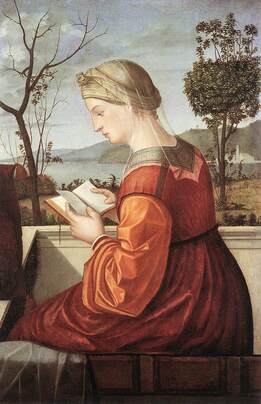|
Despite her many critiques of Aristotle, Marinella utilizes Aristotle’s concept of material and efficient causes in her defense of women. She writes,
Marinella argues that each creature shares an efficient cause in the one “Eternal Maker” or God. Despite sharing this “productive cause,” however, the creatures of the world vary in degree of perfection. Marinella claims that the degree of a creature’s perfection mirrors the perfection of the Idea or Form of that creature. Here, again, Marinella appeals to the Platonist Forms. She quotes Petrarch, who, while speaking about his beloved, Laura, writes, “In what part of the world, in what Ideas was the pattern from which nature copied that lovely face, in which she has shown down here all that she is capable of doing up there?” (54) Marinella uses Petrarch, a fellow Platonist, to highlight how the beauty and perfection of women can be traced back to the “pattern” or Idea of women in God.
Marinella describes God’s “divine precognition” of Ideas writing, “To give you a clearer example of this sort of Idea, let us pretend that an artist wishes to paint a beautiful Venus… There is no doubt that before the artist begins to draw or paint he will have fixed in his mind the sort of figure he wishes to paint and only then will he proceed to bring this image to life” (53). Like the painter, God imagines the Idea of each creature before He creates them. God also determines the degree of perfection for these creatures as He “decides which things are of less value and which are worthier”. According to Marinella, God’s “Idea of women is nobler than that of men” as seen in their unmatched “beauty and goodness” (53). In making women more perfect in Form, then, God reveals that women are worthier creatures than men. Marinella swiftly argues at the end of the chapter that women are also more excellent than men in their material cause. She writes, “I do not need to make an effort over this since, as woman was made from man’s rib, and man was made from mud or mire, she will certainly prove more excellent than man, as a rib is undoubtedly nobler than mud” (54). Marinella positions her argument within the context of the story of creation. As Eve is made from Adam’s rib and Adam made from mud, Eve, who represents all women, has a superior material cause in comparison to Adam, who represents all men. Here, once again, Marinella carefully works Aristotle’s philosophy into her defense of women as she concludes that, in both their material and efficient causes, women are superior to men. In doing so, Marinella shows her ability to critique thinkers like Aristotle while appreciating, understanding, and employing other aspects of their philosophy within a feminist defense. --MP Text source: The Nobility and Excellence of Women, and the Defects and Vices of Men. Edited and translated by Anne Dunhill, The University of Chicago Press, 1999. Image info: The Virgin Reading. Painted by Vittorio Carpaccio. Published in Venice, 1505-1510. Source: https://www.wga.hu/frames-e.html?/html/c/carpacci/2/08virgin.html
0 Comments
|
Authors
Jacinta Shrimpton is a PhD student in Philosophy at the University of Sydney. She is co-producer of the ENN New Voices podcast Archives
May 2024
Categories
All
|

 RSS Feed
RSS Feed